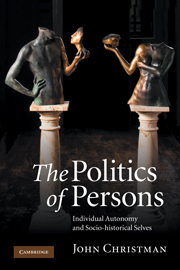10 - Justice over time: history, public reason, and political legitimacy
Published online by Cambridge University Press: 15 December 2009
Summary
Now that we have taken a stand on what autonomy should mean in the context of normative political principles, it is time to pick up on observations made earlier and give a bit more shape to these principles and the role a model of autonomy might play in them. We return, then, to political theory in order to sketch in broad terms the implications of the conclusions we have reached so far. What we mentioned in chapter 6, and can now expand upon, is that seeing selves as “socio-historical” alters the way that persons are modeled in principles of justice. This view will be expanded to include examining some of the implications of seeing individual autonomy as a basic political value in the context of principles of justice.
In this discussion, I have avoided the label “liberal” for reasons alluded to earlier; specifically, that this term is often used to refer to political regimes that see individual rights and liberties of a particular sort – rights to free speech, association, religion, property, and so on – as justified prior to, and independently of, other formal and informal social forms, including democratic practices and institutions. Whether that is plausible in general is an issue I want to leave open for now, so the family of views I am concerned with will be called “liberal” by some but are ones I generally understand as simply autonomy-based principles of democratic justice.
- Type
- Chapter
- Information
- The Politics of PersonsIndividual Autonomy and Socio-historical Selves, pp. 219 - 244Publisher: Cambridge University PressPrint publication year: 2009



